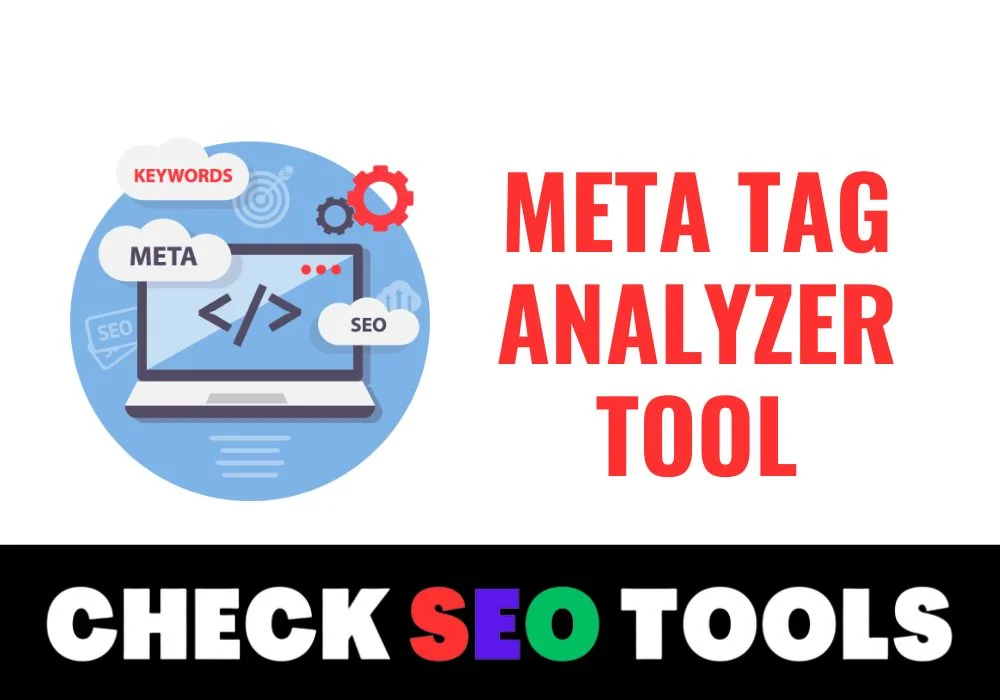Meta Tag Analyzer
It is really very easy to use the tool Meta Tag Analyzer. It helps you to check Meta Tags of any website or webpages. Enter page url below and click on 'Analyze Meta Tags' button.
Share on Social Media:
Understanding the Meta Tag Analyzer Tool: Definitions and Everyday Applications
In the world of digital marketing and SEO, meta tags are crucial for helping search engines understand your website's content. A Meta Tag Analyzer tool can be a game-changer for ensuring your meta tags are optimized and effective. This blog will delve into what a Meta Tag Analyzer tool is, provide related definitions, and explain how it is useful in daily life with practical examples.

What is a Meta Tag Analyzer Tool?
A Meta Tag Analyzer tool is an online utility that examines the meta tags of a web page to ensure they are optimized for search engines. This tool evaluates various meta tags such as the title, description, keywords, and other metadata to provide insights on how they can be improved.
What is online Meta Tag Analyzer tool?
An online Meta Tag Analyzer tool is a web-based tool that analyzes the HTML meta tags on a web page and provides a detailed report on their effectiveness and relevance. Meta tags are snippets of text that describe a web page's content and are included in the head section of the HTML code.
The tool analyzes various meta tags, such as the title tag, description tag, keyword tag, author tag, and other relevant tags. It checks the length, relevance, and accuracy of each tag and provides recommendations for improvement based on best practices and search engine guidelines.
To use an online Meta Tag Analyzer tool, a user simply needs to enter the URL of the web page they want to analyze. The tool then crawls the web page, extracts the meta tags, and generates a report that includes information such as the length of the title and description tags, the presence of keywords in the content, and the relevance of the tags to the web page's content.
The tool can be useful for website owners, digital marketers, and SEO professionals who want to optimize their web pages for search engines and improve their visibility in search engine results pages (SERPs). By analyzing their meta tags and making necessary improvements, users can improve their web page's relevance and attract more traffic to their website.
Related Definitions
- Meta Tags: HTML tags that provide metadata about the HTML document. Common meta tags include title, description, and keywords.
- SEO (Search Engine Optimization): The process of optimizing a website to improve its visibility on search engines.
- HTML (HyperText Markup Language): The standard markup language used to create web pages.
- Title Tag: A meta tag that specifies the title of a web page, which is displayed in search engine results and browser tabs.
- Description Tag: A meta tag that provides a brief summary of a web page’s content, often displayed in search engine results.
- Keywords Tag: A meta tag that lists keywords relevant to the content of the web page, though its importance has diminished over time.
- Metadata: Data that provides information about other data, in this case, about the web page.
Benefits of Using a Meta Tag Analyzer Tool
1. Enhancing SEO Performance
By analyzing your meta tags, the tool helps identify areas for improvement, making your site more attractive to search engines.
Example: If your title tag is too long, the analyzer will suggest shortening it to avoid being cut off in search results.
2. Improving Click-Through Rates
A well-optimized meta description can attract more clicks from search engine results pages (SERPs), driving more traffic to your site.
Example: The tool might suggest adding a call-to-action in your description tag to entice users to click on your link.
3. Ensuring Compliance with Best Practices
Meta Tag Analyzer tools ensure your meta tags adhere to SEO best practices, such as appropriate length and keyword usage.
Example: If your keywords tag is overly stuffed, the tool will recommend reducing the number of keywords to avoid penalties from search engines.
4. Saving Time and Effort
The tool quickly identifies issues and provides actionable recommendations, saving you time compared to manual analysis.
Example: Instead of manually checking each tag for errors, the analyzer scans and reports issues within seconds.
5. Providing Detailed Insights
The tool offers detailed reports on the strengths and weaknesses of your meta tags, helping you make informed decisions.
Example: The analysis might reveal that your description tag is too generic, suggesting more specific and engaging content.
How to use our online Meta Tag Analyzer tool?
Step 1. Open your web browser and open checkseotools.com and select Meta Tag Analyzer tool.
Step 2. On browser, Enter the page url you want to analyze.
Step 3. Click on Analyze Meta Tags button.
Conclusion
The Meta Tag Analyzer tool is essential for anyone serious about improving their website’s SEO. It helps enhance SEO performance, improve click-through rates, ensure compliance with best practices, save time, and provide detailed insights. By regularly using this tool, you can ensure your meta tags are always optimized, making your website more attractive to search engines and users alike.
Related Keywords
- Meta Tag Analyzer tool
- Analyze meta tags online
- Meta tags for SEO
- Online meta tag analysis
- Improve search engine rankings
- Meta description analysis
- Title tag evaluation
- SEO metadata analysis
- Free meta tag analyzer
- Meta tag optimization